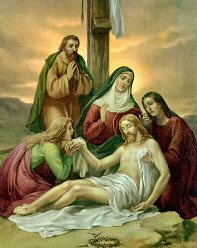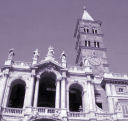
Daily Readings for:March 12, 2014
(Readings on USCCB website)
Collect: Look kindly, Lord, we pray, on the devotion of your people, that those who by self-denial are restrained in body may by the fruit of good works be renewed in mind. Through our Lord Jesus Christ, your Son, who lives and reigns with you in the unity of the Holy Spirit, one God, for ever and ever.
RECIPES
ACTIVITIES
o Good Example — A Lesson in Discipline
o Lent Hymn: Open, O Hard and Sinful Heart!
o Religion in the Home for Elementary School: March
o Religion in the Home for Preschool: March
PRAYERS
o Prayer for the First Week of Lent
o Traditional Novena Prayer to St. Joseph
LIBRARY
o Gregory the Great, a Model for Civil and Religious Leaders | Pope Benedict XVI
o Saint Gregory the Great (1) | Pope Benedict XVI
o Saint Gregory the Great (2) | Pope Benedict XVI
o The Divine Office: From St. Gregory the Great to Pius X | Benedictine Monks of Buckfast Abbey
· Lent: March 12th
· Wednesday of the First Week of Lent
Old Calendar: St. Gregory the Great, pope and doctor
According to the 1962 Missal of Bl. John XXIII the Extraordinary Form of the Roman Rite, today is the feast of Pope St. Gregory the Great. His feast in the Ordinary Form of the Roman Rite is celebrated on September 3.
Today is an Ember Day in the Tridentine Rite. There are two principal objects for the Ember Days of this period of the year: the first is to offer to God the season of Spring, and, by fasting and prayer, to draw down His blessing upon it; the second is to ask Him to enrich with His choicest graces the priests and sacred ministers who are to receive their Ordination on Saturday.
Thanks to Fear of the Lord, There is no Fear of Evil
History, in fact, is not alone in the hands of dark powers, chance or human choices. Over the unleashing of evil energies, the vehement irruption of Satan, and the emergence of so many scourges and evils, the Lord rises, supreme arbiter of historical events. He leads history wisely towards the dawn of the new heavens and the new earth, sung in the final part of the book under the image of the new Jerusalem (cf. Revelation 21-22).
It must be reaffirmed, therefore, that God is not indifferent to human events, but penetrates them realizing his "ways," namely his plans and his efficacious "deeds."
According to our hymn, this divine intervention has a very specific purpose: to be a sign that invites all the peoples of the earth to conversion. Nations must learn to "read" in history a message of God. Humanity's history is not confused and without meaning, nor is it given over, without appeal, to the malfeasance of the arrogant and perverse. There is the possibility to recognize divine action hidden in it. In the pastoral constitution "Gaudium et Spes," Vatican Council II also invites the believer to scrutinize, in the light of the Gospel, the signs of the times to see in them the manifestation of the very action of God (cf. n. 4 and 11). This attitude of faith leads man to recognize the power of God operating in history, and thus to open himself to fear of the name of the Lord. In biblical language, in fact, this "fear" does not coincide with dread, but is the recognition of the mystery of the divine transcendence. Because of this, it is the basis of faith and is joined with love: "the Lord your God requires of you, but to fear the Lord your God, to walk in all his ways, to love him, to serve the Lord your God with all your heart and with all your soul" (cf. Deuteronomy 10:12).
Following this line, in our brief hymn, taken from Revelation, fear and glorification of God are united: "Who will not fear you, Lord, or glorify your name" (15:4)? Thanks to fear of the Lord there is no fear of the evil that rages in history and one takes up again with vigor the journey of life, as the prophet Isaiah declared: "Strengthen the hands that are feeble, make firm the knees that are weak, say to those whose hearts are frightened: ‘Be strong, fear not!’" (Isaiah 35: 3-4).
Excerpted from Thanks to Fear of the Lord, There Is No Fear of Evil, Pope Benedict XVI, May 11, 2005
Things to Do:
- Your children may want to spend their afternoon learning about different local charitable organizations or needy families to whom the alms from the family's Lenten Jar will be given.

Today's Station is at St. Mary Major. The spring Ember Week consecrated the new season to God and by prayer and fasting sought to obtain abundant graces for those who on Saturday were to receive Holy Orders. The Station was fittingly held in the church, which witnessed the first scrutinies for the coming ordinations, and which was dedicated to the mother of the great High Priest.